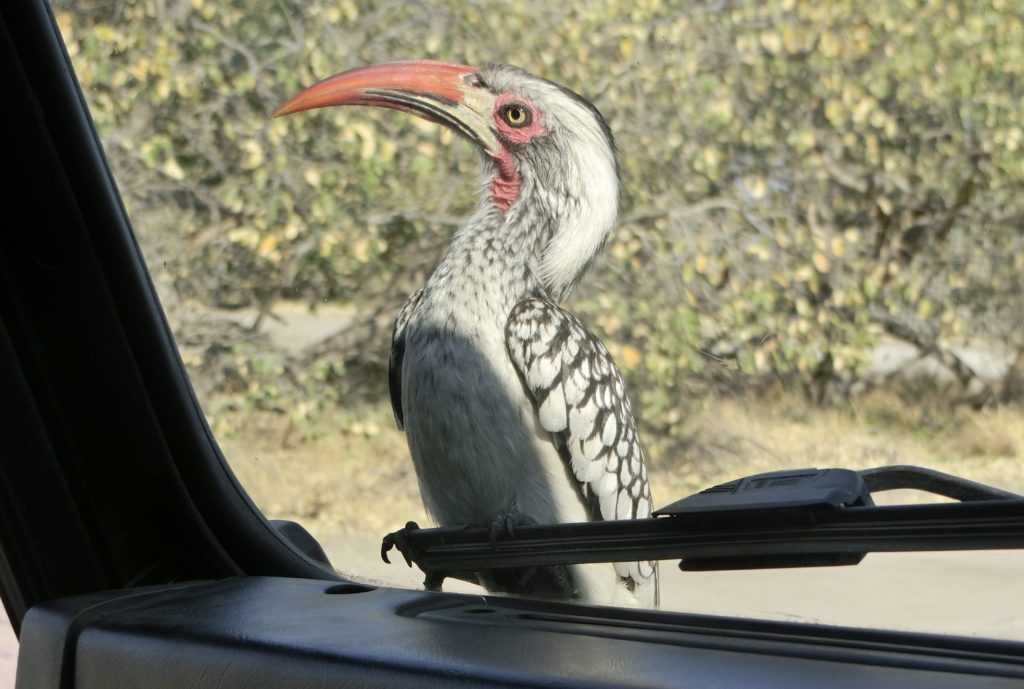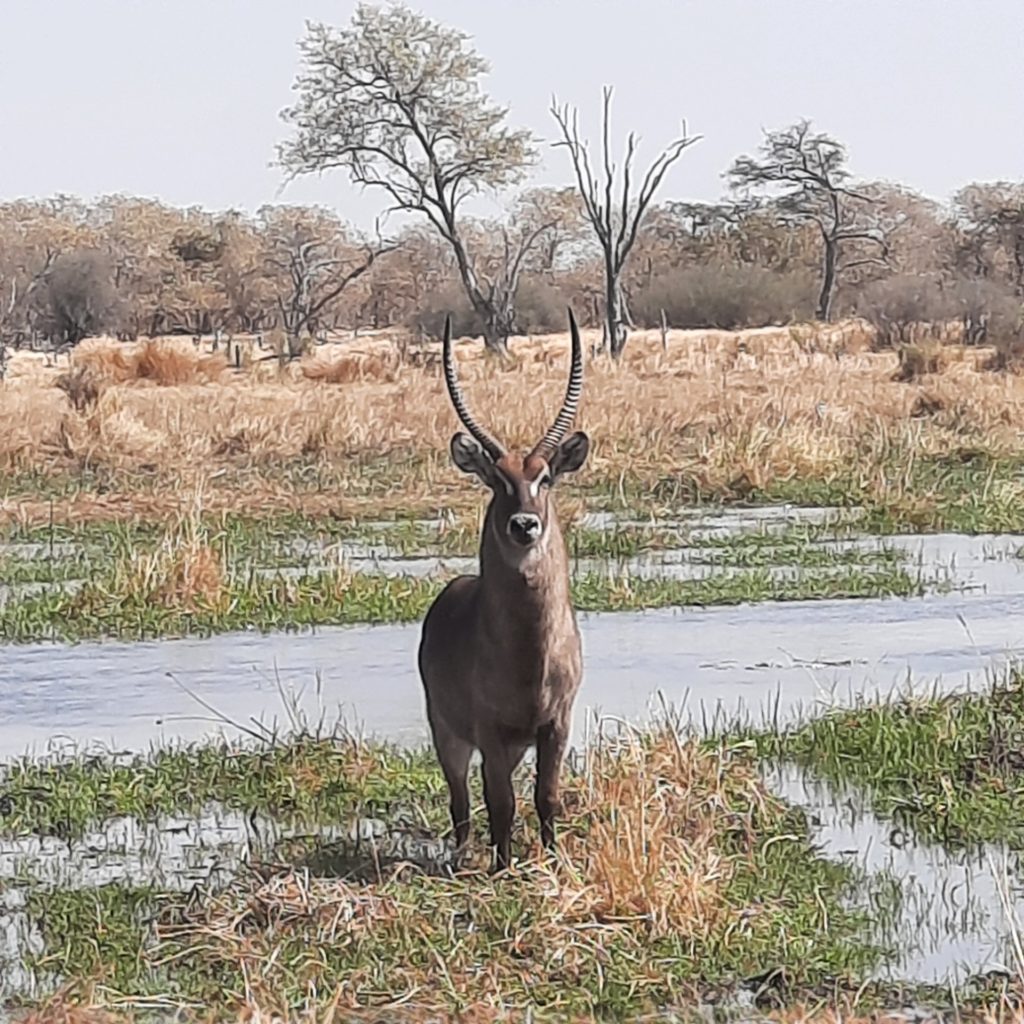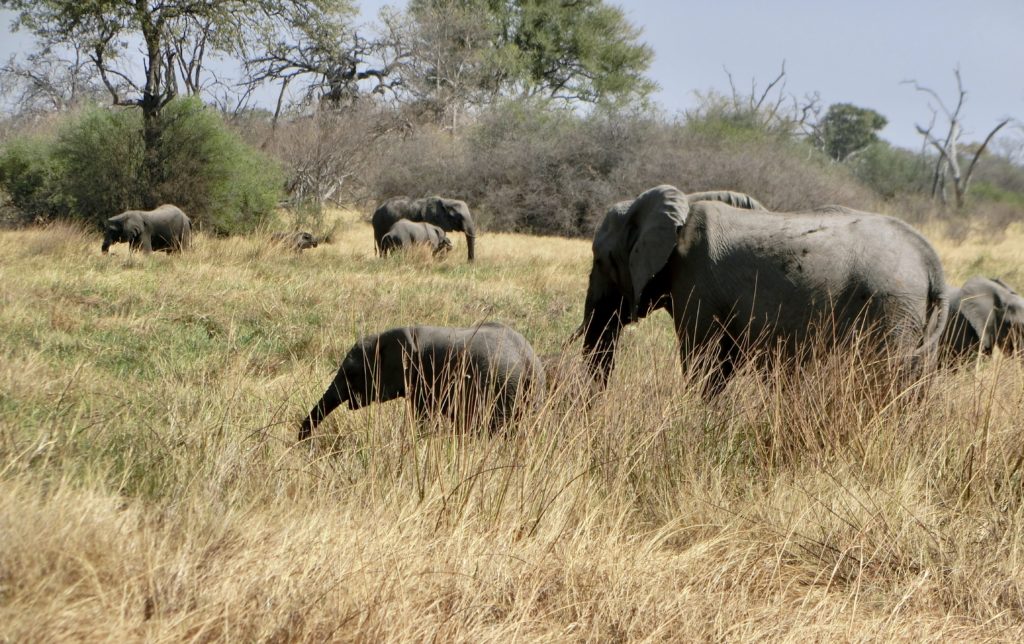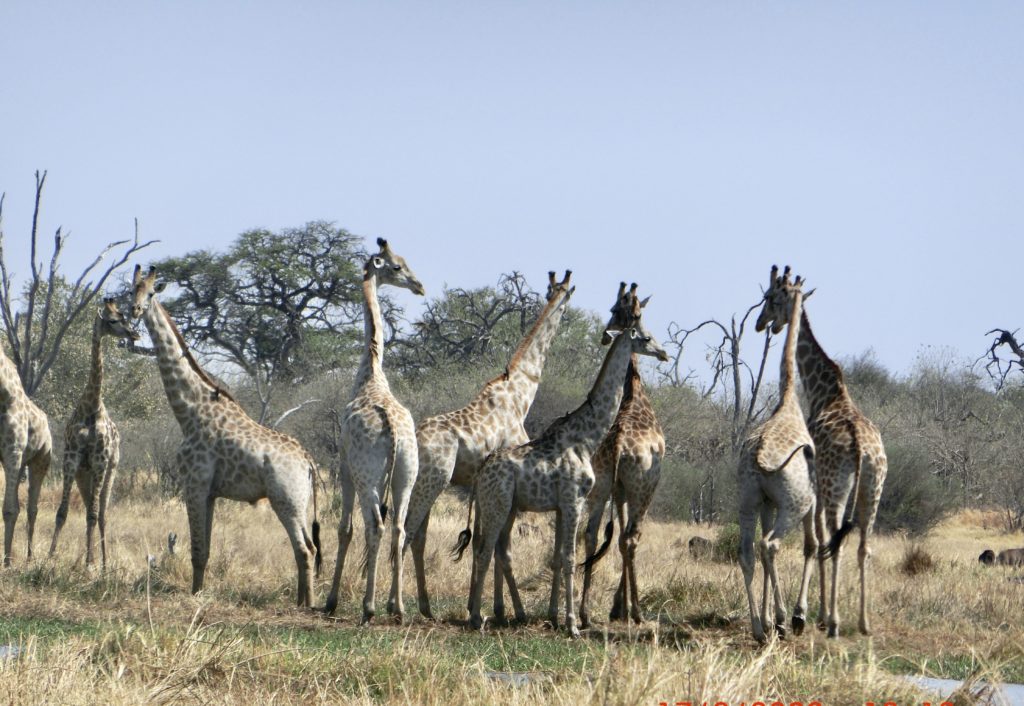Savuti to Mbabe South Gate. Chobe National Park
I didn’t sleep well. I kept lying awake listening for the lions which are supposed to come to the SKL campsite during the night. They didn’t come though. We were up early at 7am and then lions could be heard roaring, not too far away.
Before we left I went to the SKL office. Last night, the receptionist, Osa, had said she would give us phone numbers for some campsites so we could try and make advance reservations. Osa wasn’t in the office, but her boss was very helpful and called their camp in Khwai. Unfortunately, it was fully booked. She tried another camp but couldn’t get any response.

Imagine if you were that ugly..:) Red Billed Hornbill
While waiting for a reply from the second camp, 2 Kori Bustards ambled past us. Long legged birds. There is a picture of one in an earlier blog. Osa then arrived and they decided the best thing to do would be for to ask about camping at the exit gate from Chobe National Park. As we left Osa, laughing, told us to enjoy our African massage.
The track south from Savuti to Khwai divides just south of Savuti. We were advised to take the Marsh track as it is not such deep sand. Sign posting is abysmal. The occasional rock painted green with white painted names, which have almost faded into oblivion. We managed not to find the Marsh track, but followed the deep sandy track, which the Sat-Nav wanted us to take.
It soon became obvious what Osa had meant by her African massage. The track was an absolute roller coaster. The bumps and undulation are hidden by the deep sand. We, Poki and everything inside her were bouncing all over the place. I was particularly concerned about the fridge and it’s contents. However, when we checked on arrival in Khwai all was well and even our eggs were still in one piece.
The ride to the exit gate at Mababe South Gate just over 60 kms and took us over 3 hours. There was plenty of evidence of Elephant’s. Not just dung, but damaged and broken trees. They are quite destructive when a herd goes through a forest. We saw very little wildlife. A herd of impala soon after we left Savuti, a Warthog disappearing in a flash, a couple of common Duiker (very small deer) and several giraffes.
At the exit gate to the park I was advised we should contact the Khwai Community Camping Office for a campsite. This was on the iOverlander App, so we could follow the directions easily.
Khwai Community Camping and the Okavango Delta
Khwai Community Camping and the Okavango Delta
The track to Khwai was equally sandy and very winding. After a few kilometres, though, we came onto a much larger sand track and shortly found the sign for the Community Camping. Following this turn off, we soon came to water. The eastern extremes of the Okavango Delta.
The Okavango Delta is a Unesco World Heritage site. It is the world’s largest inland delta, covering an area of between 13 and 18,000 square kilometres. The water originates in the far off Angolan highlands in the January and February rains. It travels around 1,200 kilometres each month. When reaching the delta the waters disperse across it from March to June, before peaking in July and August. So, we are here at the right time.
The delta is a watery paradise of convoluted channels and islands. Home to 2,000 plant species, 65 fish species, 450 different types of birds and 200,000 large mammals.

The delta is an extraordinary phenomenon. Within a trough in the Kalahari basin, it is extremely flat. No more than a 2 meter variation in the land’s altitude. This means the waters of the Okavango river never reach the sea. They simply come to a halt, either evaporating or are drunk by plants.

As we drove beside the water a magnificent sight greeted us. Animals everywhere. Hippos by the dozen, giraffes, zebras, various types of antelope, a herd of elephants warthogs and even a Fish Eagle on a branch waiting to pounce.

Giraffe Convention.
We stopped to watch for a while, then proceeded to the campsite office. The lady in charge wasn’t exactly welcoming. I have to say, I far preferred Namibia to Botswana. People were much more friendly there. Here tourism has become more developed and money grabbing. The park fees are astronomical and last night’s camping, at half price, cost us 780 Pula, GBP46. Tonight’s is 700 Pula, so similarly expensive for basic facilities.
There was some wifi at the camp office, but a very weak signal. Dennis managed to post yesterday’s blog, but couldn’t load many photos.
At first we were told camping was fully booked, but like last night, they managed to find us a space. It was now after 2.30 pm and we were starving, so first task was to make lunch. We then decided we would go and have another look at the wildlife. Unbelievably, in that short time the animals had disappeared. We just saw the backs of a herd of elephants wandering into the distance.
We had been told it was too dangerous to walk from the campsite to the ablution blacks. You must drive. As we were driving past a block we thought we would take the opportunity to have a shower. The water was lovely and hot and with dust free hair, it felt good.
Returning to our campsite we decided we wouldn’t put up the tent until later as we might go to the water again to look for animals. A bit later a passing vehicle stopped and advised us there were 2 leopards at the hippo pool. We went to investigate. One had disappeared, but the other was fast asleep in a bush. At first it was very difficult to see. Eventually though it moved and became obvious. Really camouflaged. This was the highlight of the afternoon.
It is now dark, about 9.30 at night. We have put up the tent, dined and are inside Poki. Outside hippos can be heard, grunting. A little while ago a vehicle came towards us and in the headlights, I could see a baby hippo in the road. I think we will take the campsite advice and not venture outside on foot in the dark.
Views: 61
